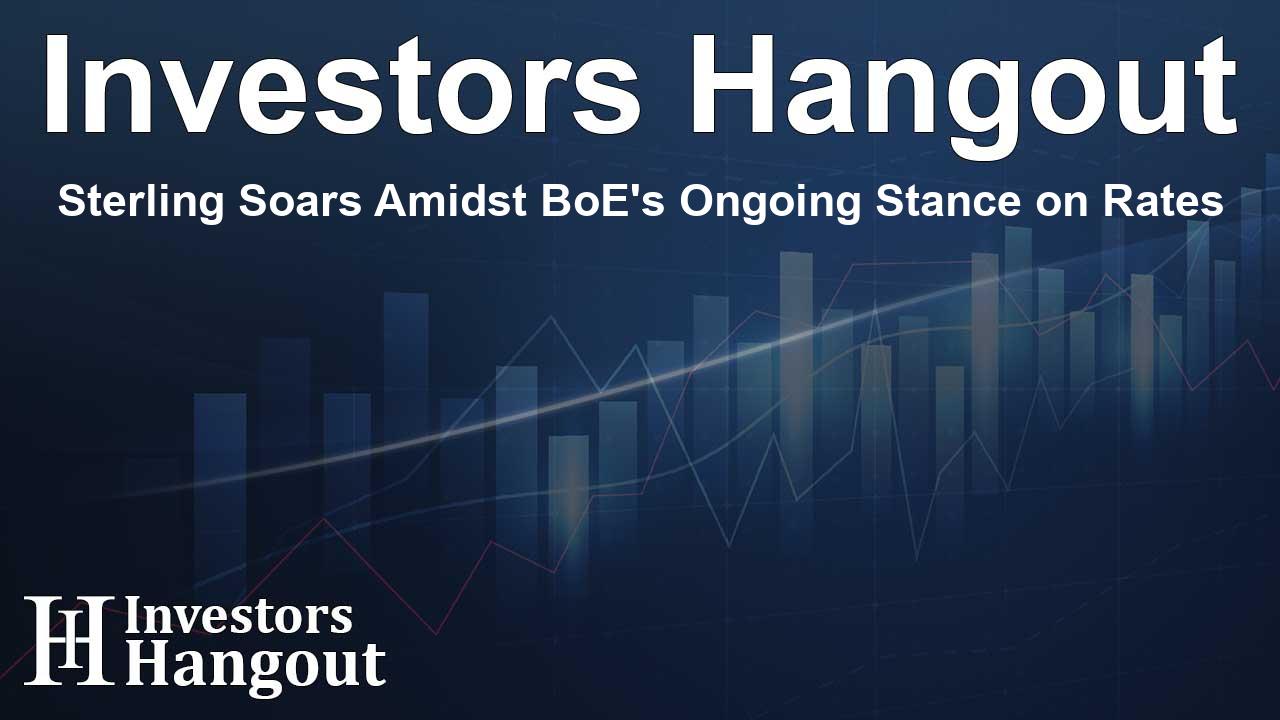Sterling Soars Amidst BoE's Ongoing Stance on Rates

Sterling Gains Strength as BoE Sticks to Its Rate Strategy
The strength of a currency can often be linked to strict monetary policies along with careful fiscal approaches. Right now, Sterling is experiencing a significant rise in value. Yet, the exact reasons for the UK government's and the Bank of England's (BoE) push for a stronger pound remain unclear.
BoE's Latest Decision
The Bank of England's recent choice to keep interest rates unchanged has sparked plenty of conversations among market analysts. Many expected this decision to be pretty routine, but its implications run deeper than they might first appear.
This rate hold brings more scrutiny on the BoE, especially in light of actions taken by other key central banks. For instance, the Federal Reserve unexpectedly cut its rates the day before, while the European Central Bank has also recently lowered rates.
Importance of the Current Policy Rate
By keeping the UK policy rate steady at 5%, the BoE not only communicates its stance but may also hint that wage negotiators should rethink their expectations. This could encourage the service sector to help contain inflation. The Bank seems to be treading carefully as it waits for definitive data from the Labour government's upcoming budget.
Decoding the Inflation Landscape
In its efforts to tackle inflation, the BoE is adopting a noticeably hawkish tone compared to other large central banks. Consequently, market speculations now suggest there's less than a 70% chance of a rate cut in November—a significant change from earlier views.
Current projections indicate that the BoE's ‘terminal rate’ is expected to hover around 3.4%, likely to be reached by next year. This anticipated rate surpasses those established by the Federal Reserve, the Bank of Canada, and the Bank of Japan, highlighting a significant premium on UK policy rates compared to what was seen prior to 2022.
Assessing Current Economic Pressures
This brings up key questions: Are the inflation issues solely tied to the UK, or are they part of a broader resurgence of historical vulnerabilities intensified by Brexit? Moreover, recent meetings by the BoE have revealed downward adjustments to GDP growth forecasts, along with an expectation of decreasing services inflation by year’s end.
The Strength of Sterling
Even in light of these worries, Sterling seems to be thriving. The promise of consistent monetary and fiscal policy has lifted the pound to its highest level against the dollar in over two years, coming close to similar highs against the euro. The pound's trade-weighted index has impressively risen by more than 3% this year, nearing its peak since the Brexit referendum.
Nevertheless, this increase in value presents its own set of challenges, potentially complicating trade amid ongoing growth issues related to Brexit. While a stronger pound may ease some import costs, it doesn't directly tackle the BoE's primary concerns regarding domestic services and wage inflation.
A Cautious Approach Ahead
The BoE recognizes the rising effective exchange rate of the pound but credits much of this to shifts in the dollar following U.S. rate adjustments. The Bank might need to align its strategy with a more aggressive pace of rate cuts if fiscal policies become significantly tighter, with some economists suggesting potential cuts by the end of the year.
Conclusion
The current scenario presents a complex view of the UK economy. The BoE is navigating a difficult path, as it faces ongoing economic pressures and lasting inflation concerns. Consequently, there’s substantial pressure on the Bank to adapt to the changing financial climate. The strength of Sterling highlights the delicate balance that must be maintained between robust fiscal measures and the need for flexible monetary policy to support the wider economy.
Frequently Asked Questions
1. Why is Sterling appreciating now?
Sterling's appreciation stems from the Bank of England's strict monetary policy coupled with a cautious fiscal agenda, which boosts confidence in the currency.
2. What is the BoE's terminal rate?
The Bank of England's implied terminal rate is around 3.4%, which is significantly higher compared to rates in other major economies.
3. How does Brexit affect the UK economy's growth?
Brexit brings unique challenges that complicate trade, which can negatively impact the UK's overall economic growth.
4. What are the implications of the BoE's interest rate decision?
By keeping interest rates steady, the BoE may signal future economic conditions and inflation management strategies impacting wage negotiations and service sector pricing.
5. How is the market reacting to the BoE's policies?
The market is recalibrating its expectations for future rate cuts, reflecting a more cautious stance following the BoE's recent strategies and communications.
About The Author
Contact Logan Wright privately here. Or send an email with ATTN: Logan Wright as the subject to contact@investorshangout.com.
About Investors Hangout
Investors Hangout is a leading online stock forum for financial discussion and learning, offering a wide range of free tools and resources. It draws in traders of all levels, who exchange market knowledge, investigate trading tactics, and keep an eye on industry developments in real time. Featuring financial articles, stock message boards, quotes, charts, company profiles, and live news updates. Through cooperative learning and a wealth of informational resources, it helps users from novices creating their first portfolios to experts honing their techniques. Join Investors Hangout today: https://investorshangout.com/
The content of this article is based on factual, publicly available information and does not represent legal, financial, or investment advice. Investors Hangout does not offer financial advice, and the author is not a licensed financial advisor. Consult a qualified advisor before making any financial or investment decisions based on this article. This article should not be considered advice to purchase, sell, or hold any securities or other investments. If any of the material provided here is inaccurate, please contact us for corrections.
